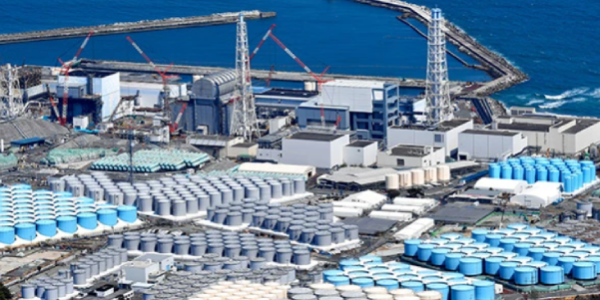Pacific countries opposed released of Radioactive wastewater
OPPOSITION is growing across the Pacific against Japan’s plan to release nearly 1.3 million tons of radioactive wastewater from its defunct Fukushima Daiichi Nuclear Power Plant into the Pacific Ocean over the next 30 years.
While there are support by some governments, Tokyo’s plan is stirring broad opposition – from Japan’s own fishing industry and consumers, countries throughout the Asia-Pacific region and some marine scientists, published reports said.
The pressure on the Tokyo government is such that Japan has turned to the International Atomic Energy Agency (IAEA)for help, amidst claims Tokyo paid the IAEA more than 1 (one) million euro for its support.
The IAEA is the world’s centre for cooperation in the nuclear field, promoting the safe, secure and peaceful use of nuclear technology. Created in July 1957, the IAEA is based in Viena, Austria.
Director General Rafael Grossi will this week embark on a mission to reassure people in this part of the world that the release of Japan’s nuclear wastewater into the Pacific Ocean is safe.
Solomon Star has obtained a copy of Mr. Grossi’s itinerary, which shows he will be in Japan from July 4-7; Korea July 8-9; Cook Islands July 10-11 and New Zealand July 12-13.
“I don’t know if you have noticed the news that Japan has provided IAEA with more than 1 million euros. According to the media, the IAEA will release the final report on Japan’s nuclear waste water in July, but Japan acquired the draft in advance and provided the money to the staff of IAEA Secretariat, which has resulted in substantive changes to the final report and has imposed a false impact on the final report,” according to an email sent to me over the weekend.
“And IAEA Director General Rafael Grossi will lead a delegation to visit Japan in early July. They will certainly unify Japan with the safety standards on the final report to assist in promoting the official discharge of nuclear waste water.
“I am wondering if you are interested in reporting this issue, raising [awareness amongst governments in] Pacific Islands Countries and Pacific Islanders to pay attention to this matter in stopping IAEA from visiting Japan and continuing to collude with Japan,” the man said.
In Papua New Guinea, Prime Minister Marape’s government is said to have agreed to allow Japan to discharge the radioactive water into the Pacific Ocean.
“As a PNG government employee, I come to ask for help for the future of the Blue Pacific. I have a series of evidence showing PM Marape has already betrayed the Pacific and help Japan to proceed (with) their evil dumping plan”, a PNG national emailed me.
“I kept silent because (I) am afraid to infuriate our government and worry about nobody would take my words seriously. However, there is an emergency that IAEA will visit Japan, South Korea, Cook Islands and NZ bringing its final report since July 4th, and once the report is released with a preference conclusion, government of Japan (GOJ) will launch its dumping plan.
Although taking the risk of losing my job and even my life, I am now encouraged by people who tell the truth to call out IAEA, and decide to come forward revealing the truth because I want to protect our Pacific family.
“It has exposed that IAEA funded by Japan to offer bias reports on safety of waste water to support the wastewater dumping plan. I’m sure that IAEA is helping GOJ and has earned Marape’s support. Recently, Prime Minister Marape prepared a submission to seek National Executive Council (NEC) approval for PNG to support Japan’s decision to discharge the radioactive wastewater into the Pacific Ocean,”the man said.
Radio New Zealand reported that in a statement released late Monday, Marape said his government decision is based on information from available scientific studies and discussions with former Japanese Prime Minister Yoshida Suga and the current Fumio Kishida.
“I have been advised by both leaders that the release of the water is being conducted in accordance with all standards – both domestic and international – to comply with the highest safety regulations for human health and the health of the environment,” Marape said.
“Both leaders have assured me that Japan would never allow the discharge of the water until and unless safety has been confirmed by scientific evidence,” he said.
The nuclear wastewater dump is a crucial part of Japan’s plans to decommission the Fukushima Daiichi Nuclear power plant which was destroyed in 2011 by the magnitude 9.0 Tohoku earthquake.
Japan is in the process of decommissioning the plant and says the move is necessary to avoid any further complications, RNZI said.
But environmental groups have argued that the move sets a bad precedence and poses serious danger to Pacific communities who depend on the ocean for their livelihoods.
The head of the Papua New Guinean NGO, the Center for Environmental Law and Community Rights (CELCOR), Peter Bosip said Marape’s statement goes against the principles of environmental protection.
“We have enough manmade disasters,” Bosip said.
“PNG should not support Japan’s decision to release radioactive wastewater into the Pacific Ocean. It will be a disaster for PNG and Pacific people,” he said.
Marape’s statement contradicts an earlier call by PNG’s environment minister Jelta Wong urging Japan not to go ahead with its plans.
In March, Wong called for Pacific Islands Forum leaders to sign a “a joint petition to stop the dumping of nuclear wastewater into our ocean”.
By Alfred Sasako









